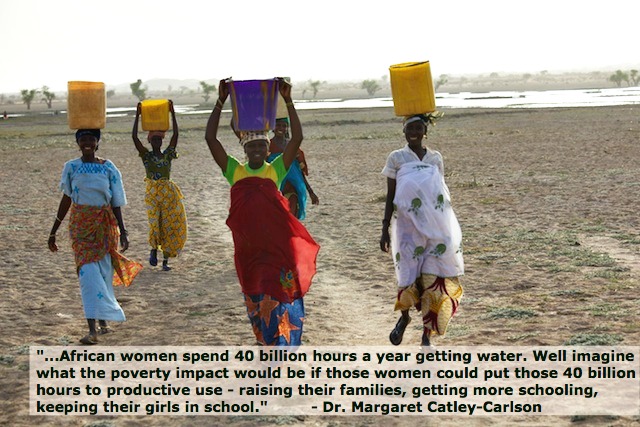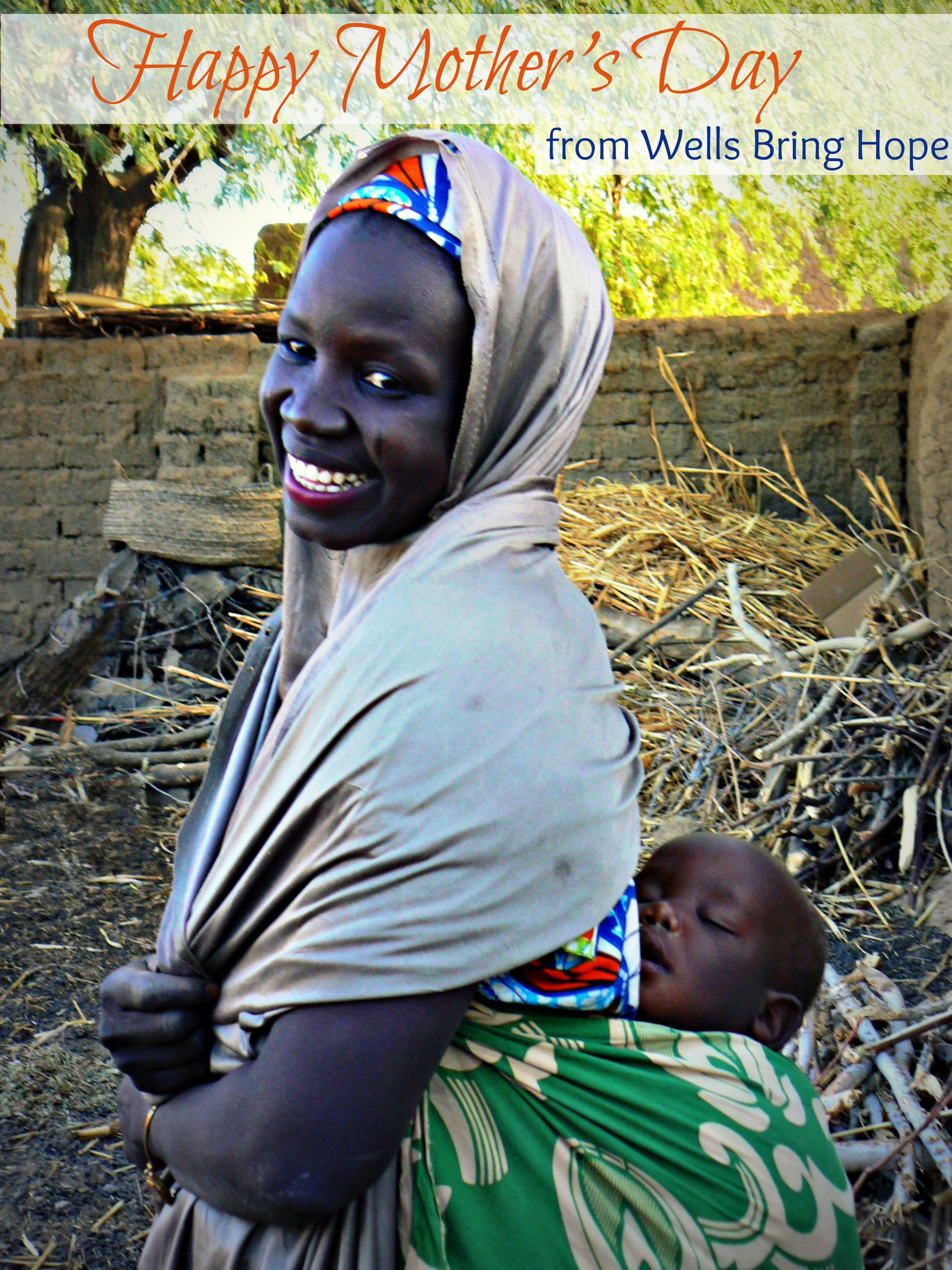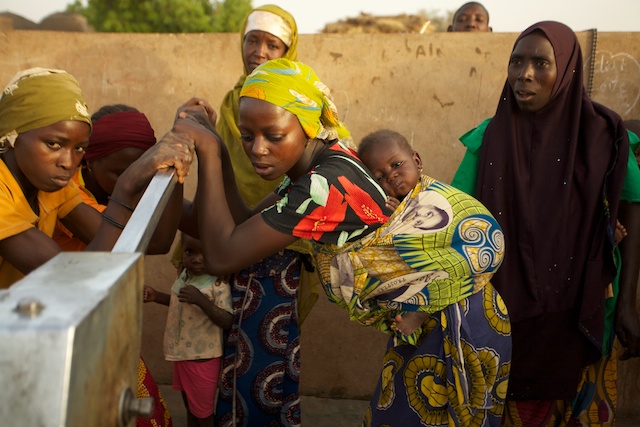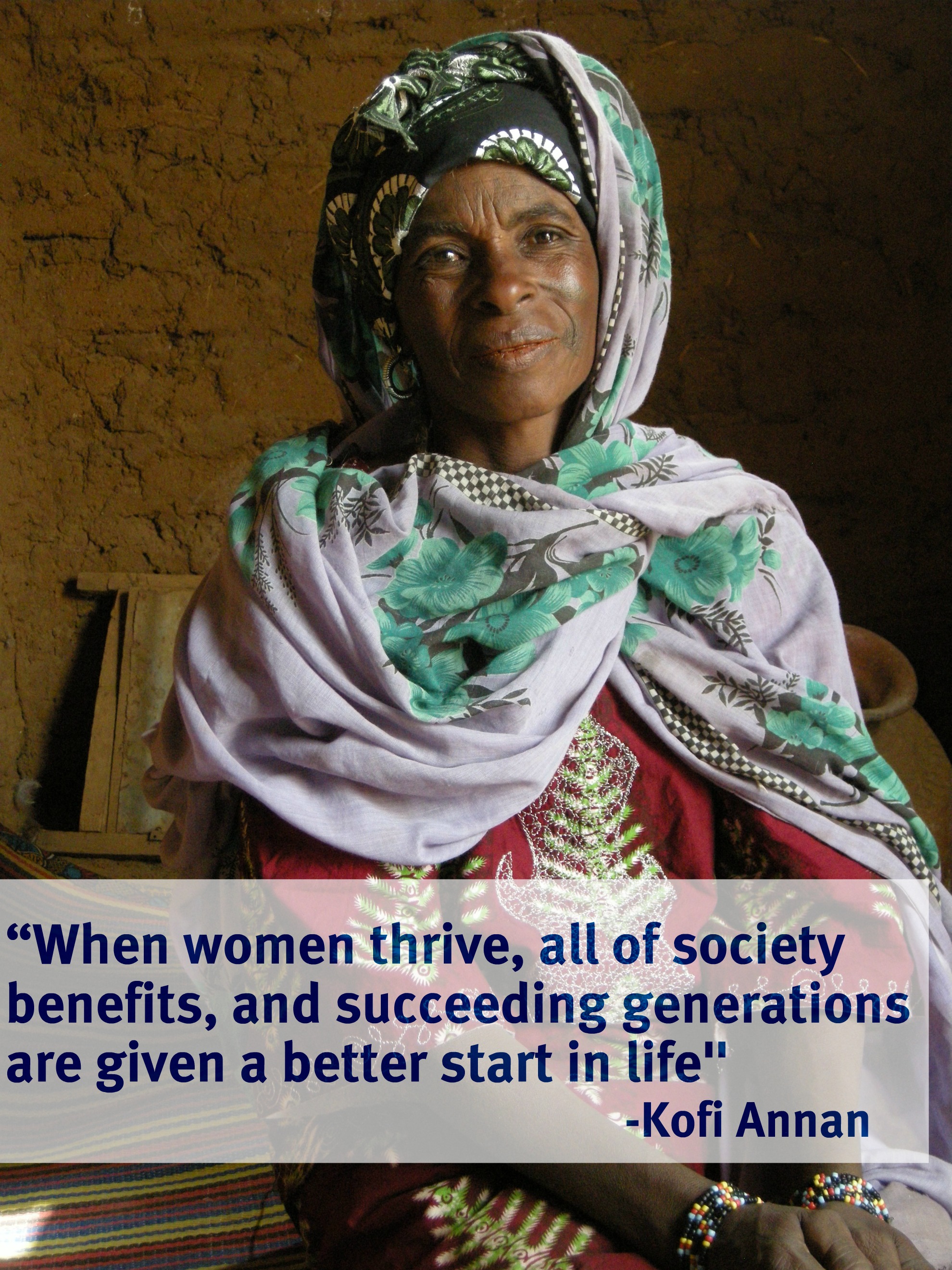 |
| {photo by Gil Garcetti} |
Mother’s Day in Niger
 |
| photo by Barbara Goldberg |
A Recent Study Ranks Niger as the Worst Place to Be A Mother
Save the Children has released its 13th annual State of the World's Mothers Report, listing Niger as the worst country in the world to be a mother. The organization ranked 165 countries based on a number of factors, bringing to light the day-to-day struggles that lead to long term and sometimes fatal consequences in a mother's life. Most factors had to do with malnutrition, a problem that can often be solved by one simple thing: easy access to clean water.
With Mother's Day fast approaching we are all reminded of what it means to be a good mother. If you are lucky enough to have a loving mother whom you cherish, you understand the reason for this May holiday. Perhaps when you're picking out the best and brightest bouquet at the local florist, you are reminded of your childhood and the sacrifices your mother made to give you the best and brightest future. Unfortunately, as this report proves, many women are not given the opportunity to go above and beyond for their children. More often, they fall short of providing the basic necessities for their children due to circumstances that are out of their control.
Here are some statistics that demonstrate the grave state of mothers in Niger and other parts of the world:
-In Niger, 1 in 5 children dies before his or her 5th birthday
-171 million children (27% of ALL children in the world) are irreversibly mentally and physically stunted due to malnutrition
-In Niger, almost every mother will lose at least one child in her lifetime.
-Malnutrition is the cause of death of 2.6 million children a year
-Breastfed children are 6 times more likely to survive the early months of childhood
Nigerien women will walk for miles everyday to find and carry back as much water as they can to provide for their families. Because of this, mothers are often unable to breastfeed their babies, a necessary component of nourishment in the most crucial stages of the babies' lives. Human breast milk provides all the nutrients newborns need for healthy development and also provides antibodies that protect against illness.
This daily journey to find water also leaves no time for women to maintain jobs, earn income, or receive education about health and nutrition. The lack of water in Niger also trickles down to agriculture, making it difficult for villages to grow food and provide necessary nutrients to children and child-bearing women. Nearly half of stunted children were irreversibly effected in utero due to the malnourished state of the mother, often due to lack of clean water.
 |
| photo by Gil Garcetti |
To put it simply, drilling a well in a Nigerien village frees up roughly 50% of a mother's time. If nothing else, this gives her time to 1. breastfeed and 2. become educated in things like: how to provide long term nutrition to her family and how to obtain the skills necessary for earning an income. These two simple things could mean life or death to a child in Niger, and we can help.
This Mother's Day, we encourage you to see your own nurturing mother in the women of Niger. Take the time to think of the ways you can honor these mothers along with your own.
If you choose to donate in honor of your mother, grandmother, or other important woman in your life, we will send her a customized donation certificate featuring the photo above. Thank you, as always, for helping us save lives with safe water.

References:
Save the Children
Kevin Kilroy is ABC 7’s Cool Kid of the Week
Kevin Kilroy has long been one of our most inspiring supporters. We’ve been singing her praises ever since she raised enough money for two wells in a single weekend! In the year or so since she became passionate about saving lives with safe water, Kevin has raised over $40,000 and in in so doing, she has transformed the lives of thousands of people. This week, we’re proud to say that we’re not the only ones talking about how amazing Kevin is – ABC Eyewitness News chose her as their Cool Kid of the Week! Congratulations, Kevin! It’s a much-deserved honor.
Wordy Wednesday
 |
| {photo by Barbara Goldberg} |
Wordy Wednesday
 |
Crusade to Fight 10 Tropical Diseases
Crusade to Fight 10 Tropical Diseases
By Pat Landowska
Thirteen major pharmaceutical companies, government groups and health charities will work together in a push to eliminate or control by 2020 10 tropical diseases that affect more than a billion people in poor countries. The partners, including the Bill and Melinda Gates Foundation, call it the largest coordinated effort ever to combat neglected tropical diseases.
The government groups and charities alone are committing just over $785 million in new funding. The companies also will work together to speed up development of new treatments, and the partners will work on improving drug delivery and treatment programs, including prevention and education.
“These ancient diseases are now being brought to their knees with stunning speed,” said Dr. Margaret Chan, the organization’s director-general.
The Bill and Melinda Gates Foundation is the project’s biggest donor, with a five-year, $363 million donation to support research and operations.
“Today, we have joined together to increase the impact of our investments and build on the tremendous progress made to date,” Bill Gates said in a statement, adding that improving people’s health would help them become self-sufficient.
According to the Gates Foundation, more than a billion people – more than half of them children – are affected by neglected tropical diseases, which either kill or cause malnutrition, serious disability, disfigurement and even social discrimination.
The diseases are common in Africa, Latin America, and Southeast Asia and contribute to poverty. They are caused by worms and microscopic parasites or infections, generally acquired from insect bites, contaminated drinking water, or contact with infected people.
In Niger, where we work, three of the 10 diseases on the list, Guinea worm, bilharzia and trachoma are very prevalent. They all are caused by contaminated water. Untreated trachoma leads to blindness. 40% of Nigeriens suffer from it, including one-third of children under the age of ten. Guinea worm lives and grows in a human body causing acute pain, swelling, and itching. Bilharzia is a water-borne parasite that although not deadly can severely damage internal organs. It is the most devastating parasitic disease after malaria.
We salute the Gates Foundation and drug companies for including these diseases on their list. The challenge, however, is getting these drugs to the villagers. In a recent trip to Niger, the Wells Bring Hope team traveled 2 1/2 hours one way over very rough dirt roads, through the desert, to reach remote villages. We will be interested to know what steps are being taken to deliver these much-needed drugs to the remote areas that most need them.
A Shorter Walk to Water Saves Children’s Lives
By Barbara Goldberg
We thank Wells Bring Hope supporter, Scott Fischler, for bringing this to our attention. A new study by Stanford researchers published by the journal Environmental Science and Technology shows that decreasing the amount of time families must walk to obtain clean water can help save the lives of young children. In sub-Saharan Africa, where Wells Bring Hope works, 84% of the people do not have access to clean water. The Stanford study analyzed data from 26 African countries, where it is estimated that some 40 billion hours of labor each year are spent hauling water, a responsibility often borne by women and children. The Stanford study is the first quantitative analysis of the relationship between the time devoted to fetching water and health outcomes.
“The time that women devote to water fetching is time that can’t be used for child care, food preparation, cleaning the household environment, or generating income,” explained Amy Pickering, lead author of the study and post-doctoral fellow at the Stanford Woods Institute for the Environment. “All of these factors can have direct influence on the health of children.”
The study found that cutting the walking time to a water source by just 15 minutes can reduce under-five mortality of children by 11%, and slash the prevalence of nutrition-depleting diarrhea by 41%.
In Niger, the many women we’ve talked to say that their work time is reduced by half when they no longer have to spend time walking many miles to get water. Therefore it is natural that when women have this new-found time, they can take better care of their children and can use that time to prepare better food. The elimination of hours spent walking to get water improves the physical health of the mother, enabling her more able to address the needs of her children. It also reduces the overall stress level that women experience when they are rushing to get water.
We are very pleased to see that there is now a quantitative study that documents the health benefits to children when there is a reduction in the time that it takes for women to get water.
LIfe Lesson from a Well
by Barbara Goldberg
October 27, 2011 was the date of Wells Bring Hope’s major fundraiser for the year, and, auspiciously, the tarot reading for that day brought greater meaning to “a well” as we know it. Those of us involved with Wells Bring Hope know that safe water comes from drilling deep into the ground to reach the artesian water level, 250-300 feet deep. Shallow wells typically yield water that is or becomes contaminated from above the surface. The analogy of a well for greater personal understanding is what we’d like to share with you. The message below is a powerful one, and reminds us that exploring the depths of our soul, having the courage to do that, can produce the greatest clarity and deepest personal insights.
From the ancient Chinese I Ching, or “Book of Changes” for October 27, 2011
48: The Well
General Meaning: Throughout various cultures and political systems of the world, the well has served as a universal symbol for that which sustains life and provides a constant, inexhaustible source of life-giving nourishment for mankind.
Like the well, human nature is the same around the world. The passage of time does not change its essential dimensions, nor take anything away. Still, just as a well can be deepened to produce clearer, cleaner water, so can we enrich our lives by delving deeply within — into our natural selves, or souls.
Beware of shallow thinking. Like a little learning, it can be dangerous. The image of the well suggests that along with depth comes clarity. Be patient, and penetrate both your problems and your own nature to the core. If you do not lower your bucket to the depths, you’re very likely to come up empty. When greater depth is desired, a lessening of speed is often required.
Soulful Celebration
On Friday night, March 2nd, Wells Bring Hope was honored to be a part of Vistamar School’s 4th Annual “Soulful Celebration” in honor of Black History Month. It was a celebration expressed through music, dance and poetry, a thoroughly joyful evening presented by some very talented students and featured guest performers, Kym Foley, Phil Brooks and the Ohio Trio Plus Band.
Vistamar has taken up our cause, making WBH the beneficiary of their fundraising for Black History Month. They have also started the Vistamar School Water Circle for on-going fundraising efforts. Founder Barbara Goldberg was a featured speaker at Friday’s event. She talked about the connection between our cause, benefiting the people of West Africa and the resilience of the people of Niger, a characteristic worthy of being passed down from generation to generation. She told the audience about Halima, a Nigerien woman who lost 11 out of 12 children as a result of contaminated water. Barbara explained how her profound loss has motivated many donors to help prevent this from happening to other women.
We owe a deep debt of gratitude to WBH volunteer Iyob Tessema, originally from Eithiopia, who initiated our contact with Vistamar and brought about this fruitful connection.
The Famine is Coming…Again
By Barbara Goldberg
When I was in Niger a month ago with a team of Wells Bring Hope volunteers, we visited about 15 villages in the areas of Maradi, Zinder and Tillaberi. Although we were there to visit villages where we had drilled wells, we couldn’t help but bear witness to what was happening regarding the food supply.
In mid-January, they weren’t calling it a famine—yet. But it was coming, there was no doubt of that. Food storage bins were very low and the drought, again, another year of drought, was clearly evident.
I’m proud to say that our partner, World Vision, who does our well drilling, was doing their best to address the food crisis. In one village, Miyaki, a village where we drilled a well and visited in January 2009, there were nutritionists giving out peanut-based food packets for the children and educating mothers on how to use them and how to help their children in this very difficult time.
For the poorest of the poor in Niger, the second poorest country in the world, World Vision has a Food for Work program that is in operation to provide people with needed food by having them work the land. Their goal was to keep people sustained in their villages, preventing the migration that occurs when food storage bins are depleted and people have nowhere else to turn but to the nearby city, hoping that someone will provide for them. We talked to Doctors without Borders people we met and they too, were gearing up for a tough time. All of the relief agencies working in Niger were in the same crisis mode.
Today, February 19, 2012, you can read about what we experienced in the CNN newsfeed. What they are writing about is what we saw a month ago. Here’s what they say: “Nearly half of Niger does not have enough to eat. The 5.4 million people struggling to stay alive are part of a wider crisis affecting at least 10 million people across the swath across Africa that borders the Sahara, known as the Sahel. This is the third time in the last decade the people of the Sahel have faced severe food shortages.”
Read more from the CNN newsfeed.
Make a one-time $50 gift to our partner, World Vision, for hunger relief in Niger.


